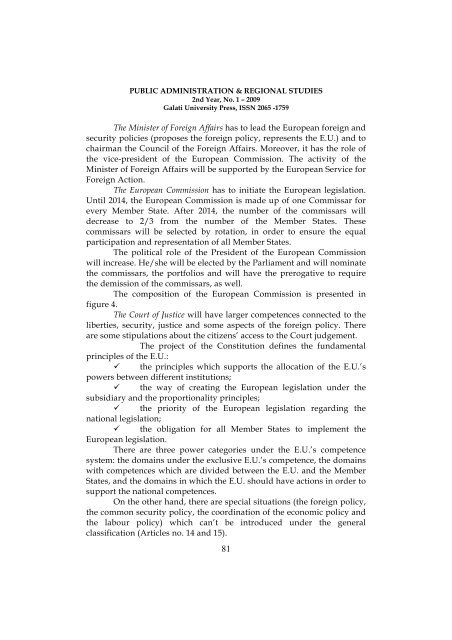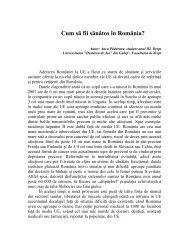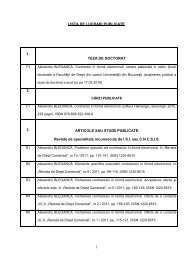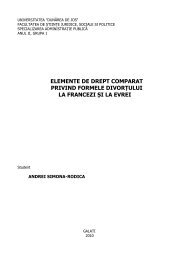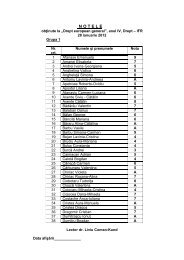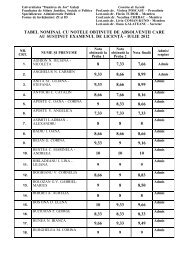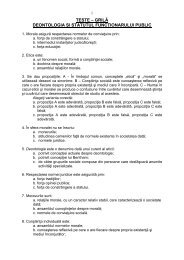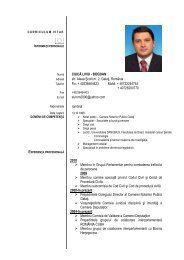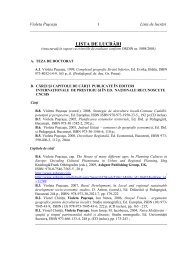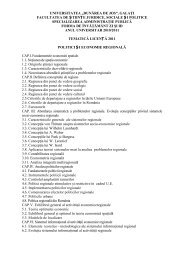regional studies public administration - Facultatea de Drept ...
regional studies public administration - Facultatea de Drept ...
regional studies public administration - Facultatea de Drept ...
Create successful ePaper yourself
Turn your PDF publications into a flip-book with our unique Google optimized e-Paper software.
PUBLIC ADMINISTRATION & REGIONAL STUDIES<br />
2nd Year, No. 1 – 2009<br />
Galati University Press, ISSN 2065 -1759<br />
The Minister of Foreign Affairs has to lead the European foreign and<br />
security policies (proposes the foreign policy, represents the E.U.) and to<br />
chairman the Council of the Foreign Affairs. Moreover, it has the role of<br />
the vice-presi<strong>de</strong>nt of the European Commission. The activity of the<br />
Minister of Foreign Affairs will be supported by the European Service for<br />
Foreign Action.<br />
The European Commission has to initiate the European legislation.<br />
Until 2014, the European Commission is ma<strong>de</strong> up of one Commissar for<br />
every Member State. After 2014, the number of the commissars will<br />
<strong>de</strong>crease to 2/3 from the number of the Member States. These<br />
commissars will be selected by rotation, in or<strong>de</strong>r to ensure the equal<br />
participation and representation of all Member States.<br />
The political role of the Presi<strong>de</strong>nt of the European Commission<br />
will increase. He/she will be elected by the Parliament and will nominate<br />
the commissars, the portfolios and will have the prerogative to require<br />
the <strong>de</strong>mission of the commissars, as well.<br />
The composition of the European Commission is presented in<br />
figure 4.<br />
The Court of Justice will have larger competences connected to the<br />
liberties, security, justice and some aspects of the foreign policy. There<br />
are some stipulations about the citizens’ access to the Court judgement.<br />
The project of the Constitution <strong>de</strong>fines the fundamental<br />
principles of the E.U.:<br />
the principles which supports the allocation of the E.U.’s<br />
powers between different institutions;<br />
the way of creating the European legislation un<strong>de</strong>r the<br />
subsidiary and the proportionality principles;<br />
the priority of the European legislation regarding the<br />
national legislation;<br />
the obligation for all Member States to implement the<br />
European legislation.<br />
There are three power categories un<strong>de</strong>r the E.U.’s competence<br />
system: the domains un<strong>de</strong>r the exclusive E.U.’s competence, the domains<br />
with competences which are divi<strong>de</strong>d between the E.U. and the Member<br />
States, and the domains in which the E.U. should have actions in or<strong>de</strong>r to<br />
support the national competences.<br />
On the other hand, there are special situations (the foreign policy,<br />
the common security policy, the coordination of the economic policy and<br />
the labour policy) which can’t be introduced un<strong>de</strong>r the general<br />
classification (Articles no. 14 and 15).<br />
81


